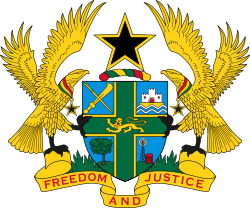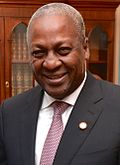| |||||||||||||||||||||||
Presidential election | |||||||||||||||||||||||
| Turnout | 69.25% | ||||||||||||||||||||||
|---|---|---|---|---|---|---|---|---|---|---|---|---|---|---|---|---|---|---|---|---|---|---|---|
| |||||||||||||||||||||||
| |||||||||||||||||||||||
All 275 seats in Parliament 138 seats needed for a majority | |||||||||||||||||||||||
This lists parties that won seats. See the complete results below.
| |||||||||||||||||||||||
Maps | |||||||||||||||||||||||
 |
|---|
| Constitution |
General elections were held in Ghana on 7 December 2016 to elect a President and all 275 Members of Parliament. [1] They had originally been scheduled for 7 November 2016, [2] but the date was later rejected by Parliament. [1] Former foreign minister Nana Akufo-Addo of the opposition New Patriotic Party was elected President on his third attempt, defeating incumbent President John Mahama of the National Democratic Congress.
Contents
- Electoral system
- Campaign
- Presidential candidates
- Parliamentary candidates
- Opinion polls
- President
- Results
- President 2
- Parliament
- See also
- References
The election results were announced on 9 December 2016 due to a delay of voting in two areas. At 19:51 local time, Mahama called Akufo-Addo to concede defeat. At 20:45, the Electoral Commission declared that Akufo-Addo had defeated Mahama in a single round. It was the first time in Ghana's history that a sitting president had been defeated for reelection.






